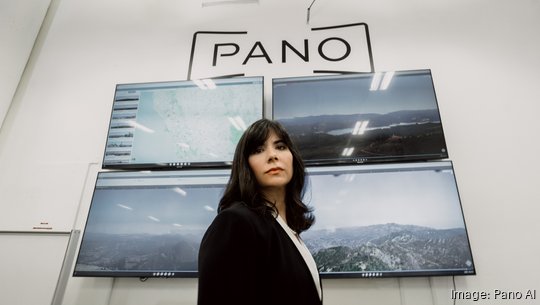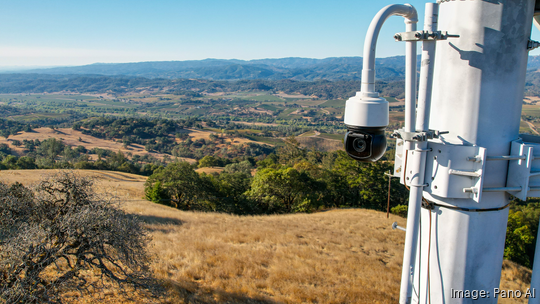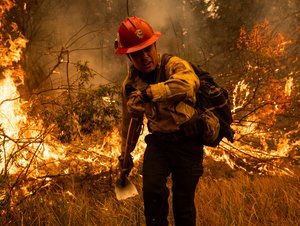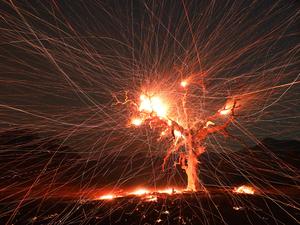
A San Francisco startup that uses artificial intelligence and computer vision to rapidly detect wildfires has raised another round of funding less than a year after announcing a $20 million Series A.
Pano AI announced on Monday that it had raised an additional $17 million that it described as an extension round, bringing its total funding to $45 million.
The new funding also came with a slightly higher valuation, founder and CEO Sonia Kastner confirmed, but she declined to provide an exact figure. The company was valued at $90 million in September after raising its initial Series A, according to PitchBook.
Instead of pursuing a Series B round, which are tough to raise right now as investors wait for better market conditions, Kastner pivoted to a Series A extension which limited dilution for its existing investors and will allow the company to continue pushing for growth.
Series B rounds have declined every quarter since the beginning of 2022, both in terms of value and the number of deals made, according to Crunchbase.
"We knew it wasn't a good year to raise a series B," Kastner told me, but "we didn't want to slow down our growth. So, we went out and raised extension funding."
New investors in the extension round include Salesforce Ventures, T-Mobile Ventures and the 5G Open Innovation Lab. And its other investors also include Initialized Capital, Congruent Ventures, Convective Capital and January Ventures.
Pano AI will raise a Series B when investors are more open to jumping into that stage, Kastner said, and the company will also start exploring developing products for additional natural disasters like mudslides after its reaches that funding milestone.
In the meantime, the company is positioned to continue investing in its engineering and product teams as it continues to build out its fire detection and alert system.
Pano AI installs panoramic cameras at strategic locations on mountain tops which continuously scan areas for signs of smoke and fire. It then quickly analyzes the footage, and if a fire is detected, it uses data from satellites and other sources to pinpoint an exact location in order to alert fire fighters.
The company claims it can detect and report fires with more accuracy and as quickly as, or quicker than, it would take for a human to call 911.
It currently has around 100 of its "Pano Stations" deployed across six states in the U.S. and two states — soon to be four — in Australia. Each station consists of two cameras that are installed on cell towers, and Kastner estimates that it would take around 15,000 cameras to cover the entire U.S.
By late September last year, the company had a dozen customers and the company has added more since then, though Kastner declined to provide an exact number.
"We're used to shipping hundreds of millions of units of product all around the world" from previous experiences at larger tech companies, Kastner said, so the Pano AI team is "not daunted by the idea of rapidly deploying 15,000 in cities all across the US."

One of the biggest hurdles is the purchasing processes for its customers.
"We're working with customers like power utilities, private landowners and then fire agencies at the city, county, state and federal level," Kastner said. "There actually has already been funding appropriated at the federal level, but the process of issuing the RFP and getting that funding spent has taken time."
Kastner founded Pano AI in 2019 after working in supply chain management for a decade at companies including Nest, Pax Labs and Juul Labs.
The company currently assembles all of its camera hardware at its own facility in San Francisco's Mission District and with a contract facility that's also located in the Bay Area.
It sources many components from third parties, but keeping the final assembly local has helped Pano AI deploy and customize its cameras quickly, Kastner said, especially with the seasonality of wildfires. And while the company hasn't been hit as hard as other hardware companies when it comes to supply chain disruptions, developing this type of camera system is still more complex than a consumer-grade smart doorbell.
"We actually have to take these cameras and identify mountaintop locations, negotiate leases with those tower companies … and then we need to hire certified tower climbers to climb 100 feet up in the air with a harness and install these cameras. And then we need to be able to service and maintain these cameras in these remote locations. The equipment needs to be very ruggedized," Kastner said. "So, it's actually a really challenging supply chain, but on the other hand, the numbers are not massive. I mean, we're not shipping millions of these panel stations. The numbers are in the hundreds. Fortunately, we haven't been hit with supply chain shortages as a main problem the way other companies have during COVID ad with trade wars."
Pano AI tends to get most of its orders from customers early in the year, around February and March, and then starts installing its systems by July, Kastner said.
Pano AI also announced several new executives on Monday including new vice president of engineering Ryan White, who was previously a senior director of engineering at Facebook and Meta for six years. White will oversee the company's AI development. The company also added Michael Golub as its vice president of finance, and Lina Rizzo as its director of people and talent.








